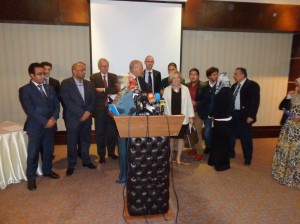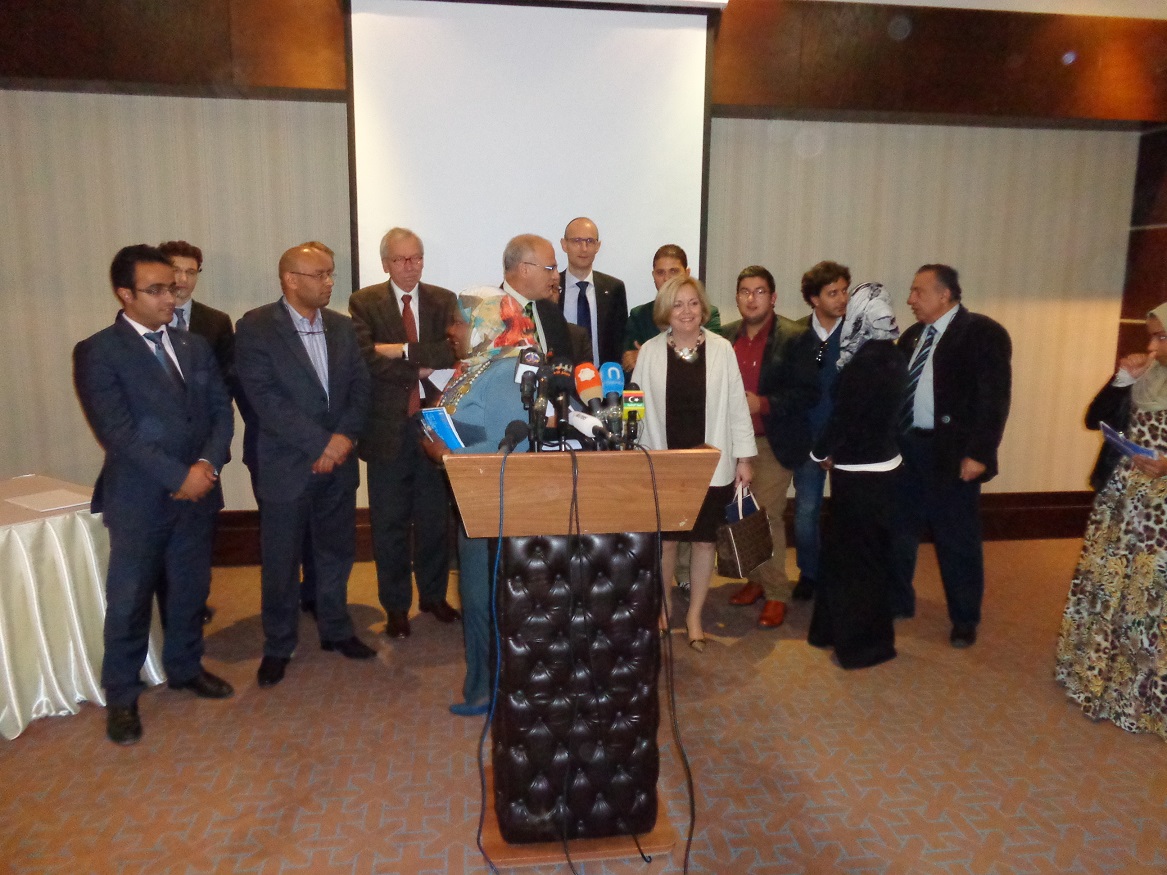By Sami Zaptia.

Tripoli, 17 February 2014:
Diplomatic representatives of countries of the European Union, the US, the European Union Delegation to Libya . . .[restrict]and UNSMIL met at a media roundtable with various representatives of Libyan media yesterday at the Radisson hotel Tripoli.
The meeting attended by representatives from the UK, US, Holland, Italy, Spain, Germany, Bulgaria, Poland, Greece, Hungary and the Czech Republic comes on the back of increased kidnappings of members of the media as well as attacks on offices of TV channels in Tripoli and Benghazi.
The latest examples are the attack on the privately-owned Al-Asema TV HQ in Tripoli last week.
This followed the Al-Asema TV’s recent decision to withdraw its staff from Benghazi following threats of violence and the suspected kidnapping of its Benghazi office director, Mohammed Al-Sarayit, who has disappeared in mysterious circumstances. A few days earlier, the Libya Al-Ahrar TV station office was also attacked in Benghazi.
The editor of Tarablus Newspaper was abducted outside a cafe close to Tripoli’s Mahari Radisson Blu Hotel two weeks ago. Three journalists for Al-Wataniya TV and two associates were also abducted on Sunday on the capital’s airport road.
Furthermore, last week, the GNC passed an amendment to the penal code, (Law No (5) 2014) which criminalized insulting the GNC, the government or judicial institutions. It also criminalized any action which could harm or prejudice the 17 February Revolution and made insulting the Libyan flag or the state logo a crime.
Leading human rights activists Lawyers for Justice in Libya (LFJL) had condemned the law last week. “This law is in direct conflict with freedom of expression provisions guaranteed by the Libyan Interim Constitutional Declaration and international human rights conventions to which Libya is a party,” LFJL said.
It expressed concern that such arbitrary restrictions to freedom of expression would have a detrimental effect on government accountability and result in the further curtailment of Libyan rights.
“The right to freedom of expression promotes the application of other human rights and helps improve government accountability,” said LFJL director Elham Saudi. “The right becomes worthless if it only protects certain forms of political expression deemed acceptable.”
She added that the criminalisation of critical expression was an extremely radical measure that was completely out of step with democratic values and Libya’s international law obligations.
Freedom of expression was an essential principle for the creation of a democratic society and to ensure the promotion and protection of other human rights, LFJL said.
“It is saddening that the GNC has failed to recognise this fundamental democratic right,” Saudi said. “We strongly urge them to reconsider these amendments.”
At yesterday’s media roundtable both members of Libya’s media and Libya’s allies echoed LFJL’s sentiment. It was noted that freedom of speech was at the heart of Libya’s February 17th Revolution, as prescribed by the Transitional Constitutional Declaration of August 2011 – the current social contract and political roadmap of Libya.
Libya’s allies underlined that they have and are willing to play a role in supporting Libya’s free media. British ambassador Michael Aron said that Britain “was concerned by the attacks on Libyan media over the last few months”. He added that Libya’s friends “wanted to hear from Libyan media as well as wanting to express their concern and support”.
US ambassador Deborah Jones noted the importance former US president Jefferson attached to freedom of speech and referred to Law No. (5) as “imprecise”. She added that “free speech is something that we all can and must rally behind”.
Representatives of Libya’s media noted that security was the paramount prerequisite for a free media, but agreed to the shortcomings that exist within the new independent media. The new Libyan media was nascent, lacking experience and a track record as a result of 42 years of suppression under the Qaddafi dictatorship, they noted.
The Libyan state in the form of the government and GNC had to improve their media output in terms of quality and quantity, it was felt. All government departments must start to play a more sophisticated role in terms of dealing with the modern-day 24 hour media. They had to be proactive, filling the media void and setting the daily news agenda. At the simplest of levels, the authorities had to be on call to confirm or deny breaking news and rumours to the media to avoid inaccurate information becoming news.
Nevertheless, Libya’s newborn media too had to accept its share of blame and responsibility by implementing a code of ethics and standards of professionalism. Equally, freedom of speech also meant accepting limitations and control on what is expressed. Libya’s new media had to exercise self-control in respect for freedom of speech.
It was noted that there is no culture of respecting the opposing view in Libya and that a culture of suspicion between the state, media and the public existed.
In conclusion, the roundtable agreed to five main takeaways from the meeting. First it was agreed that any legislation on the media sector should be arrived at through adequate consultation and consensus between the stakeholders.
Secondly it was agreed that competition within the sector was desirable in a democratic setting both between the state and the private sector, but also between the private sector itself.
Thirdly it was felt that within the sector healthy competition should be conducted in an honourable manner with professionalism, ethics and standards and mutual respect at its heart.
Fourthly, the post 17th February Revolution media sector in Libya should abandon the inherited culture of censorship and rumours.
Ultimately, it was greed that there could be no real free and viable media sector functioning in a democratic Libya without the state providing a secure environment away from the fear of threats, intimidation, kidnappings and assassinations. [/restrict]








